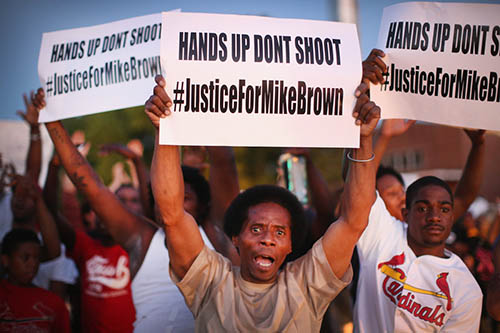I was in Las Vegas all this week at a conference (I haven’t actually written a new blog entry here in about six days, and was going through some kind of longing for it). If you’ve ever spent any significant time in Las Vegas, you know it’s a totally different place than most of the United States — and/or the world — and if you’re spending a lot of time inside the hotel/casinos, as you do at a conference, you have no idea (a) whether it’s day or night and (b) what the hell is going on, news-wise, in the world. While I was out there, Robin Williams committed suicide — that was, however, a big topic within the casinos — and this Michael Brown case evolved into a national talking point. The video above is the supposed “strong-armed robbery” (of Swisher Sweets) that happened just moments before his death. Here’s the aftermath stuff:
The incident was essentially live-tweeted (photo is graphic):
I ran from the cops and didn't get shot.. Smh this is beyond fucked. “@TheePharoah: Fuckfuck fuck http://t.co/qMGb9Ar5Go”
— Cj ❃ (@CjBabexox) August 16, 2014
This story is everywhere, and right now there’s been a second autopsy ordered, the Ferguson (MO) curfew didn’t exactly go well, and everyone’s got a viewpoint on it. Not sure I’m going to add much to it, but here goes (by the way, if you don’t know the supposed basics of the story, here’s one link you can start with):
1. This stuff is not an anomaly. You obviously have the Trayvon Martin case, but you also have stuff like Chavis Carter (still seems odd) and, well, quite honestly it happens more than we want to think. So let me start there: it’s a problem, and a real one.
2. People want to make this a racial issue, and in some ways it obviously is that above everything else — the cop was white, the offender was black, and purportedly he had his hands up in a “surrender”-type pose, as eloquently explained here:
3. Beyond the racial side, though, I think the bigger issue is actually the role of police. They actually just held a rally/town discussion in Worcester over this topic, and here’s one of the takeaways:
He said he understands what police are up against, and understands the risks they take every day. But he said that’s not an excuse for hurting people. He said the type of policing that led to the death of Mr. Brown, who was unarmed when he was shot several times by an officer, is found disproportionately in poor black and Latino communities.
“It’s good that we’re here, but this is crazy,” said Dontae McKeiver.
Flipping a commonly referenced stereotype, Mr. McKeiver admitted that sometimes, if he sees a white person across the street, he won’t cross out of fear for his own safety.
“I’m probably more afraid of them than they are of me,” he said.
4. What, then, is the role of the police? In most towns/cities, the slogan has something to do with “to protect and to serve,” right? I understand in one way how stopping Michael Brown would be akin to protection — after all, if the top video is true/accurate, he did just a rob a store — but I have no idea how shooting at him (possibly multiple times) would justify as that. That’s where it goes back to seemingly being a racial issue, because it’s not in the purview of police (as explicitly defined) to handle things that way.
Here are a couple of different studies on “the role of the police” — A, B, C, and D — and here’s a brief personal story with a lot of unrelated context. I used to hang out with a girl who predominantly slept with police officers in her 20s. She was definitely attracted to the authority and the fact that (often) they were in good shape, but one time she told me something interesting. She said that she thought the contextual development of the modern police force — whereby it tends to be a lot of guys that were alpha males in high school but then couldn’t necessarily keep up in other ways as they got older (again, a massive generalization, but you probably know a few cops like that) — was going to be bad for society. I wouldn’t say I 100 percent agree with the assessment, but I think there’s some validity.
Police is a job that needs a lot of context. Why are you here? What are you supposed to do — and on the flip side, what shouldn’t you do?
I feel like that’s what is getting lost here — yes, of course it’s a racial issue. But it’s a bigger role issue.
